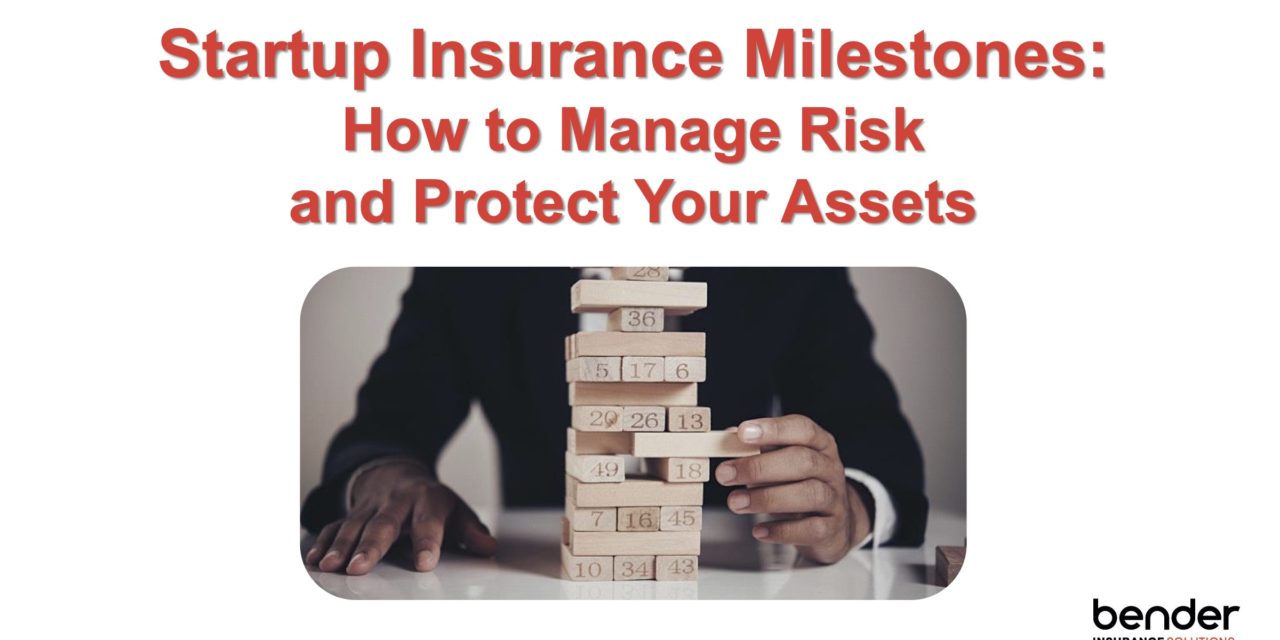At StartupSac Office Hours in August we welcomed Bryan Murray from Bender Insurance to provide an overview of the insurance milestones that startups should know about. The following article details these milestones. Also, check out video and slide deck of the event below.
Guest blog post by Bryan Murray, Bender Insurance
Move fast and break things. Think different. Get there. Startups’ and tech companies’ taglines are short and interesting but most importantly, they have an eye to the future. Most entrepreneurs are forward-thinking and risk tolerant by nature so they’re not thinking about insurance for their company in those early days. Insurance is usually not a priority until an attorney, advisor, or maybe even a board member reminds them that they need to protect their assets and in some cases, certain coverages are required by law.
The good news is that protecting your company, with insurance or other security controls, is going to make you more attractive to insurance underwriters as well as potential investors. Both groups are going to make sure you’re controlling your risk.
There are a few milestones in your business that should prompt you to contact your insurance broker and confirm you have the proper coverage in place to protect what you’ve already built, and are building in the future.
- Company formation:
You should probably opt for General Liability (GL) right out of the gate to protect yourself from the bare minimum of slips and falls, even if you’re all working remotely. It’s very inexpensive for startups. You could also go for a Business Owners Policy (BOP), which combines GL and Commercial Property insurance. And it’s never too early to get a Cyber policy, which is detailed below.
Potential policies needed: GL, BOP, Cyber - Board formation:
This is one of those times you may be required to have certain insurance in place. Most savvy board members will insist you have a proper Directors & Officers (D&O) policy, which protects their personal assets, as well as any top tier execs and leadership you’d like to hire in the future.
Potential policy needed: D&O - Signing a commercial lease:
Commercial Property insurance protects your assets including buildings, equipment, furniture, and inventory.
Potential policies needed: Commercial Property, GL, Workers’ Comp, BOP - Signing a large client contract:
Those larger clients will also require coverage you may not have enough of yet, including cyber insurance. This will transfer the costs involved with a cyber security breach or attack. It protects you, your clients, and your partners. With 60% of attacks now occurring against small to midsize companies, cyber insurance is a necessity, along with basic security controls at your business (multi-factor authentication, segmented backups, employee security awareness training).
Potential policies needed: Cyber, D&O, GL - Rapid growth:
Growing your team opens up the company to much more risk in the HR arena. You will probably offer employee benefits but there could also be claims related to discrimination or harrassment, so it’s important to have Employment Practices Liability (EPL). A lesser understood coverage is Errors & Omissions (E&O), which is basically like malpractice insurance for companies. You may do everything right but if a client wants to get litigious, this policy will help cover the legal costs.
Potential policies needed: Tech E&O, EPL, Employee Benefits - Institutional funding:
Once you’re at the stage of raising money from an institutionally-backed VC, you will probably have some form of all the policies listed above, but you will need to expand your coverages. Your D&O coverage will need a review, along with a potential new coverage called Key Person. VCs may require Key Person life on a technical founder. It’s a bit morbid, but it can provide a cushion if the sudden loss of an individual in the company would have a detrimental effect on its operations.
Potential policies needed: D&O, Tech E&O, Key Person
Summary:
Check with your insurance broker during these milestones:
- – Company formation
- – Board formation
- – Signing a commercial lease
- – Signing a large client contract
- – Rapid growth
- – Institutional funding













